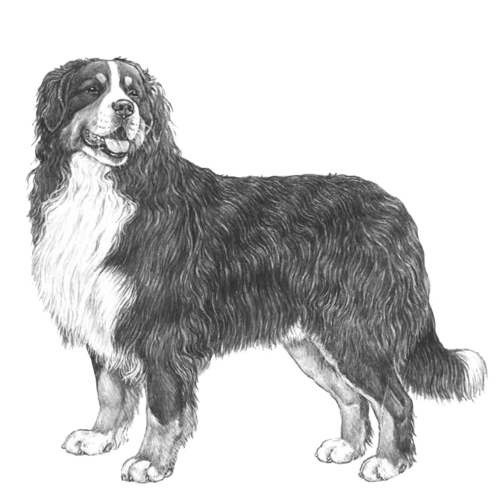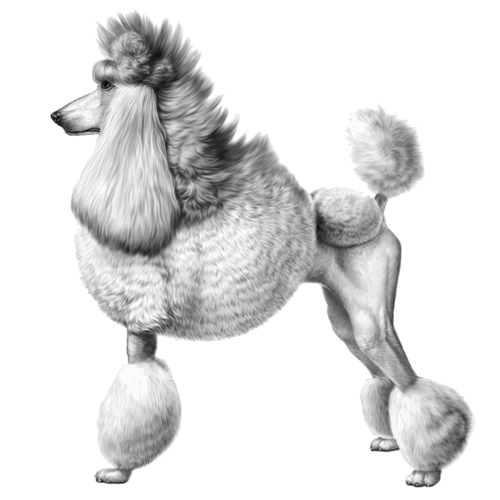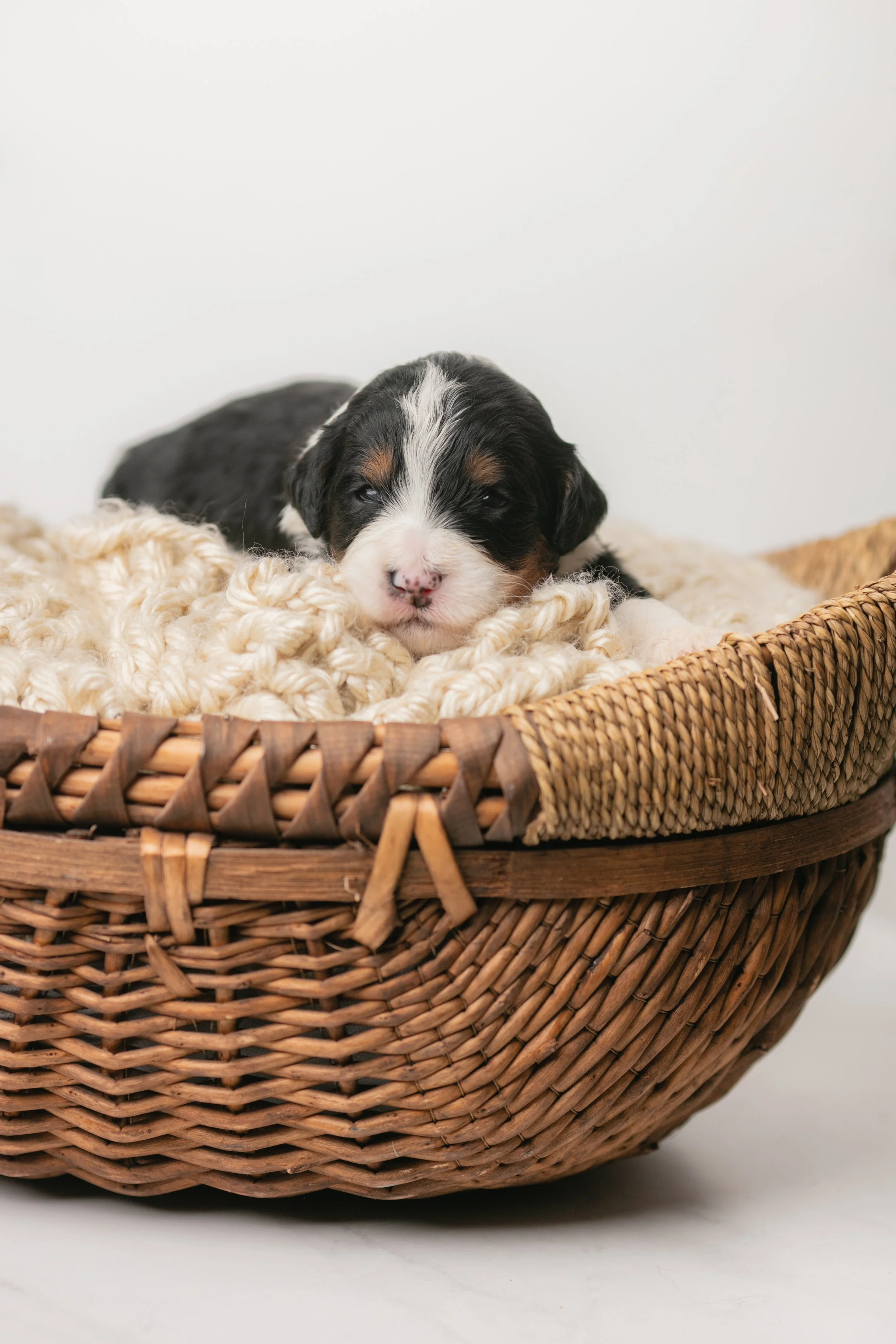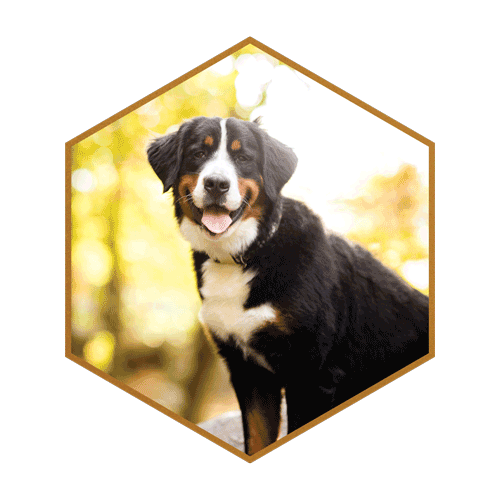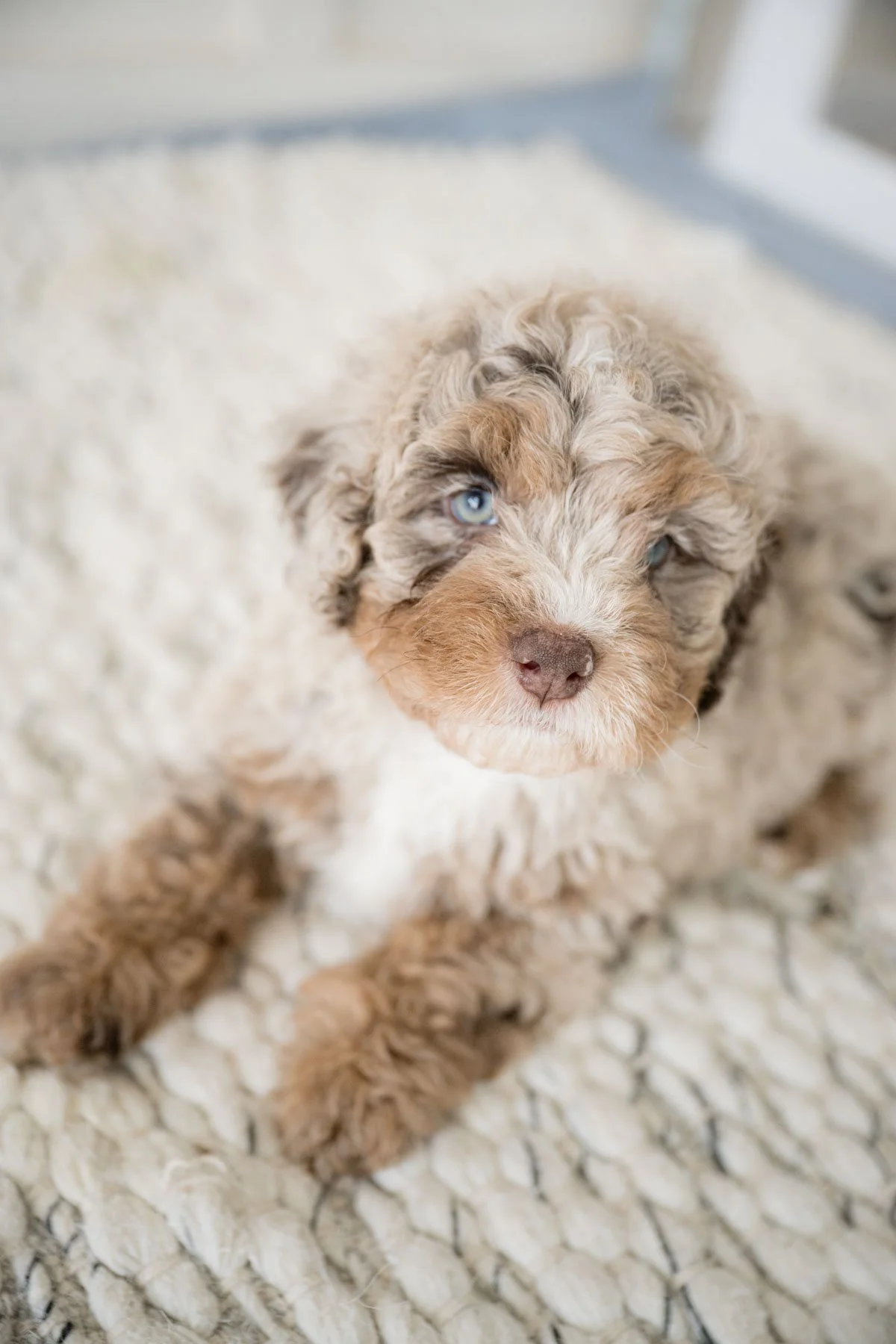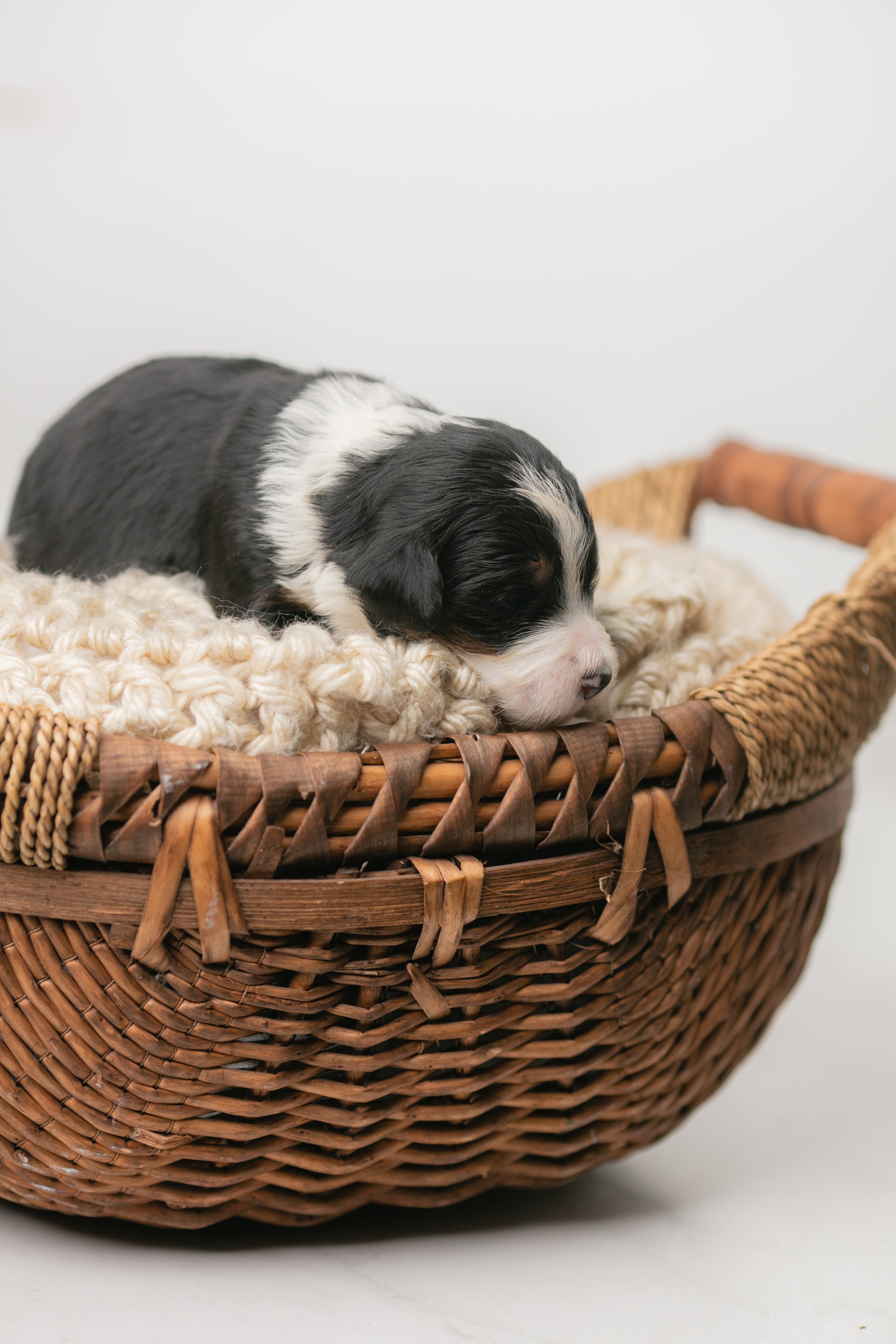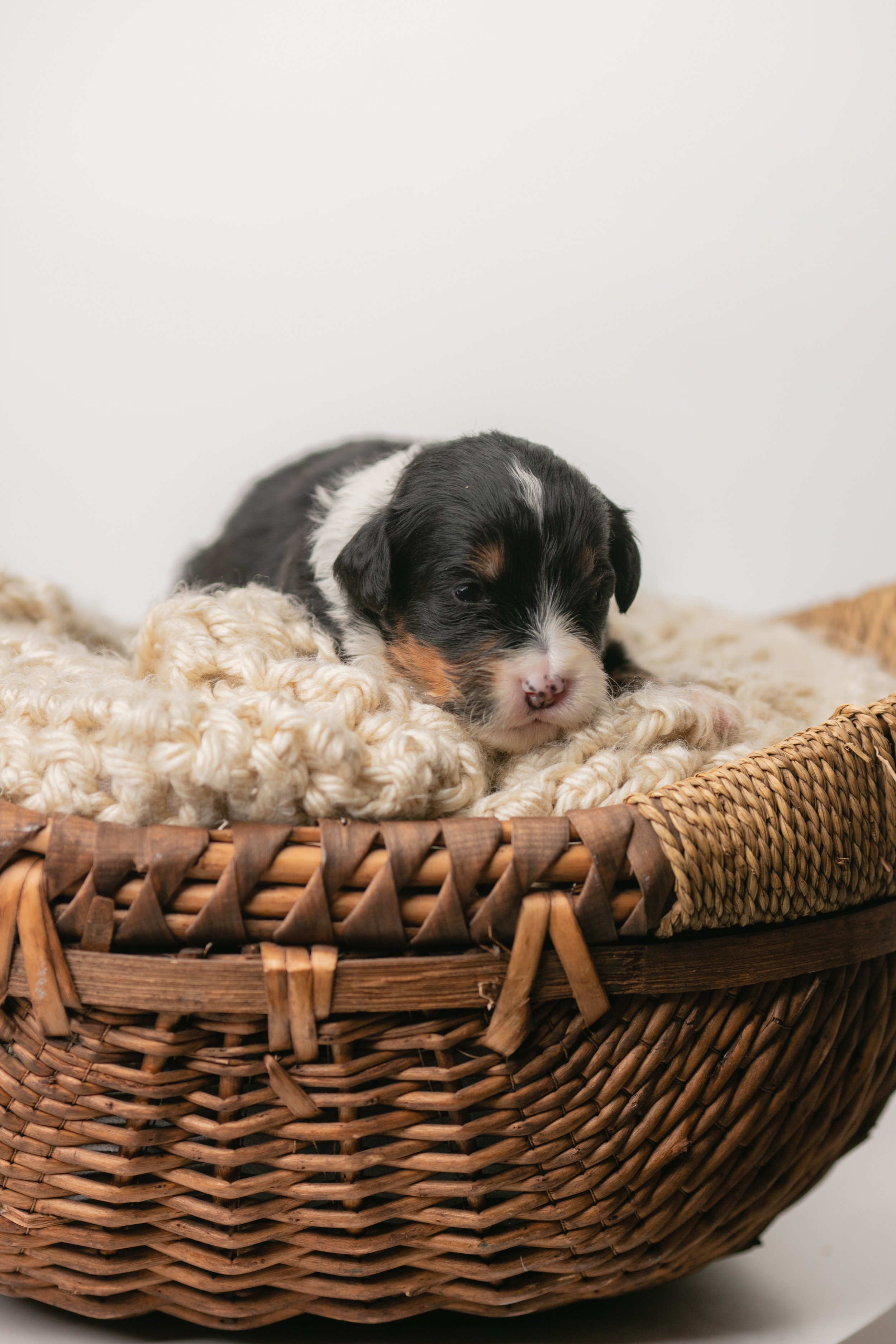What is a Bernedoodle?
“Bernese Mountain Poo”
“Friendly, gentle, smart, affectionate.
Best Suited For: Families with children, active singles and seniors, and houses with yards.
”
Bernedoodle
BREED TRAITS & CHARACTERISTICS
Size: Mini (20-35 lbs), Medium (35-50 lbs), Standard (50-70 lbs)
Lifespan: 12-15 years
Trait Description Size: Mini (20-35 lbs), Medium (35-50 lbs), Standard (50-70 lbs)
Lifespan 12-15 years
Coat Types: Wavy, Curly, or Straight
Colors: Traditional Black Tri, Black Phantom, Chocolate Tri, Brown Phantom, Blue Merle Tri, Red Merle Tri, Phantom Merle, Red & White Tuxedo, Sable, Black & White, Tri Parti, Red & White
Shedding: Low to Non-Shedding
Energy Level: Moderate – Enjoys activity but also loves downtime
What is a Bernedoodle?
A Bernedoodle is a designer hybrid dog breed that combines the best traits of the Bernese Mountain Dog and the Poodle. These affectionate, intelligent, and playful dogs are known for their loyal nature, hypoallergenic coats, and loving temperament. They are a great fit for families, therapy work, and active individuals looking for a social and trainable companion.
Why Choose a Bernedoodle?
Intelligent & Trainable – Bernedoodles are eager to please and excel in obedience.
Loyal & Affectionate – They bond closely with their families and enjoy companionship.
Hypoallergenic & Low-Shedding – Ideal for allergy-sensitive owners.
Great Therapy & Service Dogs – Their calm demeanor makes them excellent emotional support companions.
Versatile Size Options – Available in Micro Mini, Mini/Medium, and Standard sizes.
Bernedoodle Sizes & Generations
Bernedoodle Size Categories:
Micro Mini 10-24 lbs
Mini/Medium 25-49 lbs
Standard 50+ lbs
Bernedoodle Generations Explained
F1 Bernedoodle (50% Bernese, 50% Poodle) – Wavy or curly coat, moderate to low shedding.
F1b Bernedoodle (75% Poodle, 25% Bernese) – Curly, non-shedding, best for allergy sufferers.
F2 Bernedoodle (F1 x F1 Cross) – Coat type varies, moderate shedding possible.
Multigen Bernedoodle – Selectively bred for coat consistency and temperament.
Bernedoodle Temperament & Personality
Bernedoodles are friendly, intelligent, and affectionate. Their personality can be a mix of their parent breeds:
Loyal & Loving – They form strong bonds with their families.
Playful & Social – They enjoy interactive play and companionship.
Intelligent & Trainable – They respond well to positive reinforcement training.
Moderate Energy Level – They need daily exercise but also enjoy relaxing with their families.
Bernedoodle Colors & Coat Patterns
Bernedoodles come in a variety of stunning colors, influenced by their Bernese Mountain Dog and Poodle genetics:
Bernedoodle Grooming Needs
Bernedoodles require consistent grooming to maintain their coat and minimize matting:
✔ Brush 3-4 times per week to prevent tangles.
✔ Professional grooming every 6-8 weeks.
✔ Regular ear cleaning & nail trimming.
✔ Bathing every 4-6 weeks to keep the coat clean.
Bernedoodle Coat Types
Bernedoodles can have straight, wavy, curly, or unfurnished coats. At Stokeshire Designer Doodles, we focus on producing furnished, allergy-friendly coats, but some litters may include unfurnished puppies.
Unfurnished Bernedoodles Explained
Furnished Brown Merle Tri also called red or chocolate merle Tri
Furnishings (RSPO2 gene) determine the classic doodle look—giving Bernedoodles their fluffy faces, beards, and lower-shedding coats. Unfurnished Bernedoodles lack these furnishings, resulting in a straighter, Bernese-like coat that may shed more. While they often shed less than a purebred Bernese Mountain Dog, they are typically not recommended for allergy sufferers.
At Stokeshire, we use genetic testing to predict each puppy’s coat type before selection day. If you’re looking for a low-shedding, hypoallergenic Bernedoodle, we recommend furnished, wavy, or curly-coated puppies, which inherit more Poodle-like traits.
Ultra or Reverse F1B Bernedoodles
An Ultra Bernedoodle, also called a Reverse F1B Bernedoodle, is a 25% Poodle / 75% Bernese Mountain Dog mix. This occurs when an F1 Bernedoodle (50/50 Poodle & Bernese) is bred back to a purebred Bernese Mountain Dog rather than a Poodle.
What Makes Reverse F1B Bernedoodles Unique?
More Bernese Traits – They typically resemble the Bernese Mountain Dog more closely in appearance, temperament, and coat type.
Straighter, Silkier Coat – Unlike standard F1B Bernedoodles (which have more curl due to higher Poodle genetics), reverse F1Bs often have a straighter or wavy coat, making them less hypoallergenic and more prone to shedding.
Larger Size – They tend to be bigger than standard Bernedoodles since they inherit more Bernese genetics.
Gentle & Loyal – Their temperament is calm, affectionate, and loyal, like a traditional Bernese Mountain Dog, with slightly improved lifespan and hybrid vigor.
Are Reverse F1B Bernedoodles Hypoallergenic?
Because they have less Poodle influence, Reverse F1Bs are not recommended for allergy sufferers. Their shedding varies, but they typically shed more than standard Bernedoodles.
At Stokeshire Designer Doodles, we focus on low-shedding, allergy-friendly Bernedoodles through genetic testing. If you're looking for a Bernese-like dog with a longer lifespan and a slightly reduced shedding coat, a Reverse F1B Bernedoodle might be the right fit!
Exercise & Training Needs
Daily Walks – At least 30-60 minutes per day.
Mental Stimulation – Puzzle toys, obedience training, and interactive games.
Outdoor Activities – They enjoy hiking, fetch, and agility exercises.
Bernedoodle Health & Lifespan
Bernedoodles are generally healthier than purebred Bernese Mountain Dogs, with an average lifespan of 12-15 years. However, they can be prone to the following conditions:
Hip & Elbow Dysplasia – Common in larger breeds.
Progressive Retinal Atrophy (PRA) – A genetic eye condition.
Bloat (GDV) – A serious condition that requires monitoring.
Skin Allergies & Sensitivities – Regular grooming and a high-quality diet help prevent issues.
At Stokeshire Designer Doodles, all our puppies undergo comprehensive genetic health testing to ensure they are free from major hereditary concerns.
Why Choose Stokeshire Designer Doodles?
Dedicated to Raising Healthy, Happy Puppies
We are a state-licensed, ethical breeder (License #514401-DS) committed to breeding Bernedoodles with excellent health, temperament, and coat quality.
Therapy-Grade Training & Socialization
Our puppies are raised using early neurological stimulation and socialization programs to ensure a smooth transition into family life.
Doodle School Training Program
We offer 4-week puppy training programs and Bootcamp options to support families in the early training stages.
Secure & Trusted Adoption Process
We provide safe payment options and nationwide puppy delivery to make the adoption process seamless and stress-free.
Quick Facts About Bernedoodles
-
Bernedoodles are generally considered to be intelligent and eager to please, which can make them relatively easy to train. However, as with any breed, it's important to start training and socialization early and to be consistent, patient, and positive in your training methods. It's also important to keep in mind that every individual dog is different and may have their own unique personality and learning style, so it's always a good idea to consult with a professional trainer or behaviorist if you have any concerns or need additional guidance.
-
Bernedoodles can be trained to fetch, just like many other breeds of dogs. It's important to note that all dogs have the potential to learn new behaviors and tricks, but some may be more naturally inclined to perform certain tasks due to their breed's natural instincts and tendencies.
To teach your Bernedoodle to fetch, you can start by introducing a toy and encouraging them to retrieve it. Use a command like "fetch" or "get it" and praise them when they bring the toy back to you. You can also use treats or other rewards to reinforce the behavior.
Keep in mind that it may take some time and patience to teach your Bernedoodle to fetch, and some dogs may be more interested in the game than others. It's important to be consistent and use positive reinforcement techniques to help your dog learn and succeed.
-
Bernedoodles are typically more expensive than other breeds. This is due to several factors, including breeding costs, health testing, and the fact that Bernedoodles are often hypoallergenic and non-shedding, making them a great choice for allergy sufferers. Additionally, Bernedoodles are a relatively new and popular breed, which can drive up the cost.
-
The size of a Bernedoodle can vary greatly and is typically determined by the size of its poodle parent. They can range from 10 inches tall and 10-24 pounds (Tiny Bernedoodles), to up to 29 inches tall and 70-90 pounds (Standard Bernedoodles). No matter the size, each Bernedoodle is filled with a whole lot of love!
-
Absolutely! Bernedoodles are versatile dogs that adapt well to various living situations. They are just as happy in an apartment as they are in a large home with a backyard, provided they get enough exercise. Their friendly and sociable nature makes them excellent companions.
-
The answer to this question depends on your personal preference and lifestyle. Both breeds are intelligent, friendly, and great with families. The most notable difference lies in their appearance and coat types. Bernedoodles tend to have wavier, denser coats, while Goldendoodles' coats can range from straight to curly. As for colors, Bernedoodles usually come in black, black and white, black and brown, or tri-color. Goldendoodles, on the other hand, can come in a broad range of colors from cream to red, chocolate, and even multi-colored. If you're interested in a mix of both, consider the Golden Mountain Doodle, a mix of Bernedoodle and Goldendoodle.
-
Bernedoodles are considered low to non-shedding, but shedding levels can vary depending on their generation and coat type. F1 Bernedoodles (50% Bernese Mountain Dog, 50% Poodle) may shed slightly, while F1B (75% Poodle, 25% Bernese) and multigen Bernedoodles are more reliably non-shedding due to their higher Poodle influence.
At Stokeshire, we use genetic testing to predict shedding in each litter. Key genes like RSPO2 (furnishings), MC5R (shedding), and KRT71 (coat curl) influence whether a puppy will shed. By carefully selecting parent dogs with the right genetic traits, we can provide more accurate shedding predictions for each puppy, ensuring families find the best fit for their needs.
-
Bernedoodles are considered low-allergen dogs, but no breed is truly 100% hypoallergenic. Their hypoallergenic qualities depend on their coat type and genetics. Dogs with a higher Poodle influence (such as F1B and multigen Bernedoodles) tend to have more non-shedding, curly coats, which trap dander and allergens more effectively.
At Stokeshire, we use genetic testing to assess key traits like coat curl (KRT71), furnishings (RSPO2), and shedding (MC5R) to predict allergy-friendly puppies. If allergies are a concern, we recommend selecting a Bernedoodle with a curly, fully furnished coat, as these are the most hypoallergenic.

